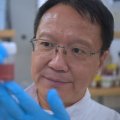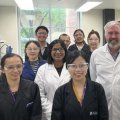Researchers from The University of Queensland’s School of Health and Rehabilitation Sciences will be practising their research in community health internationally after receiving Queensland International Fellowships.
Dr Kylie Tucker and Dr Annina Schmid were among 11 UQ researchers who received Queensland International Fellowships in the 2011-2012 funding round.
Dr Tucker was awarded $15,000 to attend France’s University of de Nantes to further her research project: Does distribution of stiffness within a muscle underlie movement changes with pain.
Dr Schmid received $13,742 to attend the University of Wuerzburg in Germany to continue her research: Identification of nerve cell loss in patients with peripheral neuropathies.
Both projects will draw on leading international research to develop new analysis and treatment methodologies which have the potential to positively impact pain management in the community.
In her research into the processes that underlie movement changes with pain, Dr Tucker will determine if the change in muscle activity during acute pain is associated with reducing muscle stress in the painful region, and if these changes resolve after the pain has ceased.
She will work with specialist researchers at the University of de Nantes who utilise innovative ultrasound techniques to measure the changes in muscle stress immediately after the onset of acute pain.
The ‘supersonic shear imaging’ ultrasound device is not currently available in Australia.
“I will be the first researcher from Australia (to my knowledge) who will use this technique, and will be able to bring these skills back to Queensland for use in future studies,” she said.
“The results of my studies will provide new information about movement changes with pain that are likely to influence the development of rehabilitation programs, and ultimately reduce the economic and personal burden of chronic pain in the community.”
Dr Tucker said in 2007, approximately 3.2 million Australians were estimated to experience chronic pain, costing approximately $34.3 billion.
She said a change in muscle control and function had been implicated in the tendency for chronic pain.
“Despite the enormity of this problem, mechanisms that underlie persistent musculoskeletal pain and disability are poorly understood.
“We anticipate this research program will form the basis of multiple basic science and clinical studies investigating the mechanisms underlying movement changes and the effect of these changes on the population of people with chronic pain.”
As part of the Fellowship funding, Dr Schmid will work with Professor Claudia Sommer, Head of the internationally-renowned Neurology Department at Germany’s University of Wuerzburg to examine early pathophysiological changes in carpal tunnel syndrome (CTS).
CTS results from compression of the median nerve at the wrist. This nerve is vital for normal hand function and symptoms of CTS include numbness, tingling in the hand, pain and weakness.
“Despite the significant socio-economic impact of the disorder, the pathophysiology of CTS is not yet fully understood and therefore there is no agreement on diagnostic criteria,” Dr Schmid said.
“In Queensland, current waiting times for CTS are approximately 12 months.
"The longer symptoms exist, the poorer the treatment outcomes.
"Early and accurate diagnosis is important to refer patients for appropriate conservative and surgical management.”
As part of her research, Dr Schmid will quantify nerve cell density of skin innervated by the compressed median nerve in patients with CTS, compared to a control group without nerve pathology.
She said correlations of nerve cell loss with patients’ symptoms and function will be evaluated to determine effective diagnostic and management options for patients with CTS.
“The outcome of the research will improve early diagnosis of CTS which will thereby enhance patient management and prevent progression of the disease from a mild to a more severe stage,” she said.
“Additionally, the project has the potential to decrease health care costs and surgery waiting times, leading to a healthier Queensland.”
Media: Kirsten Rogan, 07 3346 4713
.jpg)




